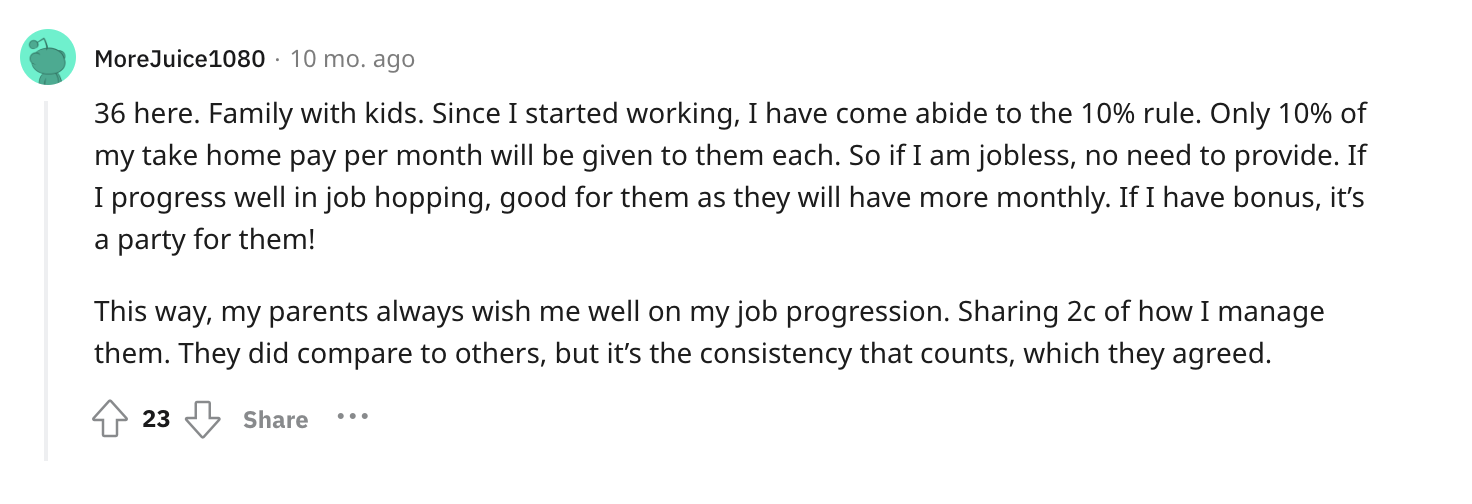Money can often be a sensitive subject, especially when it comes to discussing how much financial support we should provide to our parents each month.
This is a common consideration for many people as they enter adulthood, start earning their own income, and experience newfound financial freedom.
Determining the right amount of allowance to give to your parents is a personal decision influenced by various factors, including your level of comfort, income, and family circumstances.
If you’ve ever wondered whether you’re giving your parents too little or too much financial support but paiseh to ask around your social circle, there’s no need to worry.
The Straits Times has undertaken an online survey with market research firm Milieu Insight, gathering responses from 1,000 individuals aged 18 to 58.
This survey explores how attitudes towards financial support for parents have evolved across different generations.
Survey participants were categorised into three generational groups: Gen Z (aged 18 to 26), millennials (aged 27 to 42), and Gen X (aged 43 to 58).
68% of Gen Z Give Allowance to Parents, 45% of Them Give Between $300 to $500
According to the survey findings, approximately 68% of Gen Z respondents provide a monthly allowance to their parents.

Among these Gen Z respondents, filial piety was the primary motivation for offering financial support, cited by 55% of participants.
Other prevalent reasons included the desire to reciprocate the love and care received from their parents and the intention to relieve their parents of financial concerns.
For 39% of Gen Zers, providing an allowance was seen as a way of contributing to household expenses, particularly if they lived in the same house as their parents.
Regarding the amount of financial support provided, 41% of Gen Z individuals offered less than $300 per month, while 45% contributed between $300 and $500 monthly.
Roughly half of the Gen Z respondents reported allocating between 10% to 20% of their monthly income for the allowance.
Among those who did not provide an allowance to their parents, the top reasons cited were that their parents were financially secure and did not require additional support.
Some respondents mentioned facing their own financial challenges as a hindrance.
Interestingly, about a third of respondents mentioned that their parents had advised them against providing an allowance.
78% of Millennials Give Allowance to Parents, 17% of Them Give Above $500
If you’re a millennial curious about how much others give their parents, here’s the info you need.
About 78% of millennials who participated in the survey confirmed that they provide their parents with an allowance, while the remaining respondents do not.
Similar to Gen Zs, filial piety emerged as the most frequently cited reason for offering an allowance, with 59% of respondents indicating this as their motivation.
A significant number of respondents (45%) expressed that providing an allowance to their parents was a personal blessing.
Approximately 26% of respondents reported giving less than $300 monthly, with 45% contributing between $300 and $500 each month.
Another 17% allocated $501 to $999 on a monthly basis.
Approximately 50% of respondents mentioned that they dedicate between 10% and 20% of their monthly income to the allowance, while just over 40% allocated a smaller percentage.
Among those who do not provide an allowance to their parents, the top reasons cited were that their parents are financially secure and do not require additional support, or that the respondents are experiencing personal financial challenges.
Approximately 15% mentioned having other dependents at home to care for, such as children.
76% of Gen X Give Allowance to Parents, 23% of Them Give Between $501 and $999
Gen X, being the eldest among the three generational groups, reportedly gives a higher allowance to their parents.
Approximately three-quarters (76%) of Gen X respondents reported providing an allowance, while the remainder did not.
Filial piety remained the most commonly cited reason for providing an allowance among Gen Xers, with 62% of respondents selecting this motivation.
The second most frequently mentioned reason (56%) for providing an allowance among Gen Xers was the financial need of their parents, who may be retired or unemployed.
Around two in five Gen Xers give between $300 and $500 monthly, while 24% allocated less than $300.
What set Gen Xers apart from other generations was the substantial number of respondents (23%) who gave between $501 and $999 monthly, with another 11% contributing between $1,000 and $1,999 each month.
45% of Gen X respondents stated that they provide between 10% and 20% of their monthly salary, while 46% offer less than 10%.
This implies that although Gen X respondents tend to earn more, the proportion of the income allocated to their parents is similar to that of younger generations.
Among those who do not provide their parents with an allowance, the most frequently cited reason was that their parents were deceased.
Other explanations for not providing an allowance included parents who are “financially secure and not requiring additional support” and personal financial difficulties.
How Much Allowance Should You Give to Your Parents?
Considering that the survey involved 1,000 participants, there are likely to be outliers.
A Reddit discussion on the typical amount of money Singaporeans give to their parents has emerged, and opinions vary.
For the most part, the general consensus among many people is to provide their parents with an allowance amounting to 10% of their income.

In other words, if someone earns $3,000 monthly, they would allocate $300 to their parents.
However, one Reddit user pointed out that the amount should depend on individual circumstances, emphasising that the primary motivation for giving back to parents is typically rooted in filial piety.

How much do you personally provide to your parents? Does your contribution fall below or exceed the average amount for your age group?
Would you be jailed for being half-naked in public? Well, the answer will shock you. Seriously. Watch this to the end and you'll understand:



